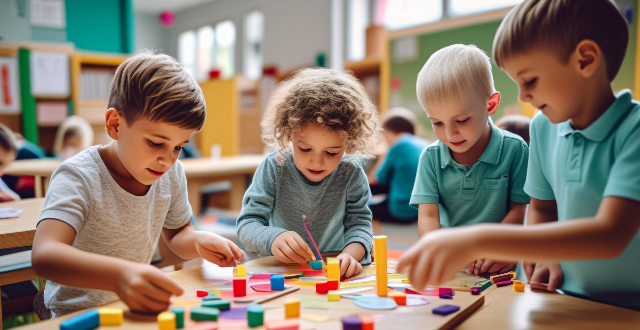Teachers in preschool education play a pivotal role in laying the foundation for children's lifelong learning and development. They are responsible for guiding learners, building foundational skills, encouraging creativity and imagination, promoting physical health and wellness, supporting emotional development, facilitating socialization, and partnering with families. Teachers provide emotional support, foster curiosity, focus on social and communication skills, introduce cognitive concepts, engage children in creative activities, ensure physical activity and healthy habits, contribute to emotional well-being, help children learn how to be part of a community, and work closely with families. Their impact extends beyond the classroom into the formation of well-rounded individuals ready to face future challenges.

The Role of Teachers in Preschool Education
Teachers play a crucial role in preschool education, which is the foundation for a child's lifelong learning and development. Their responsibilities extend beyond just teaching academic subjects to include nurturing social, emotional, physical, and cognitive growth. Here are some key aspects of their role:
Guiding Learners
Teachers guide young learners through the early stages of education, helping them develop basic skills such as reading, writing, and math. They create a stimulating environment that encourages curiosity and exploration.
- Providing Support: Teachers offer emotional support and create a sense of security within the classroom.
- Fostering Curiosity: They stimulate children's natural curiosity and help them learn through hands-on experiences.
Building Foundational Skills
Preschool teachers focus on building foundational skills that will serve as stepping stones for future learning.
- Social Skills: Children learn how to interact with peers, share, and cooperate.
- Communication Skills: They are encouraged to express themselves clearly and listen actively to others.
- Cognitive Development: Basic concepts in math and language are introduced, laying the groundwork for more complex learning.
Encouraging Creativity and Imagination
Teachers provide opportunities for children to engage in creative activities, which enhances imagination and problem-solving abilities.
- Art Projects: Through art, children can express themselves and develop fine motor skills.
- Storytelling: Engaging stories can improve language skills and spark creativity.
- Music and Movement: These activities help with coordination and rhythm while also being enjoyable.
Promoting Physical Health and Wellness
Physical health is an important aspect of early childhood education. Teachers ensure that children have time for active play and movement.
- Outdoor Play: Access to outdoor environments allows for physical activity and exploration of nature.
- Healthy Habits: Lessons on hygiene, nutrition, and exercise establish good habits from an early age.
Supporting Emotional Development
Emotional well-being is vital for overall development. Teachers contribute to this by providing a caring and structured environment.
- Emotional Intelligence: Children learn to recognize and manage their feelings and empathize with others.
- Positive Reinforcement: Praise and encouragement boost self-esteem and motivation.
Facilitating Socialization
Preschool is often a child's first experience in a communal setting outside the family. Teachers help children learn how to be part of a community.
- Friendship Skills: Children learn how to make friends and build relationships.
- Diversity Awareness: Exposure to diverse peers helps children understand and appreciate differences.
Partnering with Families
Teachers work closely with families to ensure consistency and continuity in a child's education.
- Communication: Regular communication keeps parents informed about their child's progress and needs.
- Collaboration: Partnerships between home and school support the child's learning journey.
In conclusion, teachers in preschool education are much more than instructors; they are guides, mentors, and caregivers who lay the essential groundwork for children's future successes. Their impact extends beyond the classroom into the formation of well-rounded individuals ready to face the challenges of the world ahead.